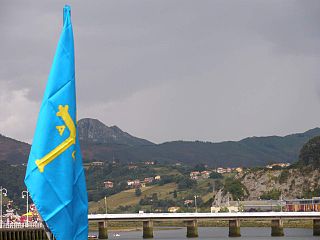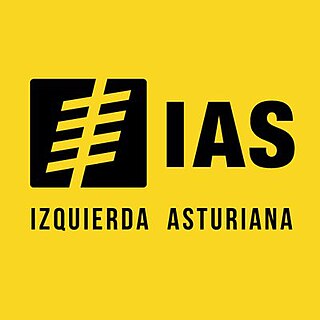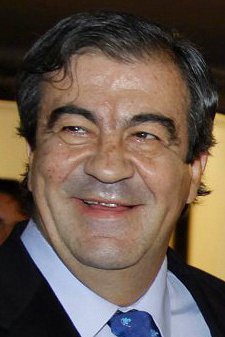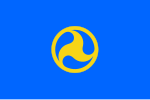
"Asturias, patria querida" is the official anthem of the autonomous community of Asturias, in Spain.

Andecha Astur is an Asturian nationalist leftist political party of Spain.

Izquierda Asturiana is an Asturian nationalist leftist political party of Asturias, Spain.

Xaviel Vilareyo y Villamil was an Asturian writer born in Mieres in the Province of Asturias, Spain in 1967. He is associated with the Asturian literary group of the 1990s.

Darréu–Mocedá d'Izquierda Soberanista is a left-wing Asturian nationalist youth organization. It is based in the Asturias region of northwestern Spain.

Nationalism and regionalism is present in the political spectrum of the Principality of Asturias, northern Spain. Asturian nationalist parties such as Partíu Asturianista had representation in the Asturian parliament and government, and others such as Andecha Astur had representation in some municipalities. However, nationalism is more of a social than a political movement.

Unidá is an Asturian federation of parties formed by Asturian Left, members coming from Andecha Astur, and by the local parties Andecha por Carreño, Asturianistes por Nava and Asturianistes por Piloña, forming a local series of groups with the name of Unidá such as Unidá-Avilés or Unidá-Uviéu.

The 2011 Asturian regional election was held on Sunday, 22 May 2011, to elect the 8th General Junta of the Principality of Asturias. All 45 seats in the General Junta were up for election. The election was held simultaneously with regional elections in twelve other autonomous communities and local elections all throughout Spain.
Asturias Forum, previously known as Forum of Citizens is a regionalist political party in the Principality of Asturias.

Conceyu Bable was an Asturian association legalized in 1976, which objective was the recovery and dignification of the Asturian language.
Conceyu Abiertu is an Asturian political organization of left-wing and Asturian nationalist ideology. Conceyu Abiertu emerged as a municipalist platform in the municipal and regional elections of 2011.
Compromisu por Asturies is an Asturian political organization of left-wing and Asturian nationalist ideology. Compromisu por Asturies is the result of the merge of two previous political parties: Unidá and Bloque por Asturies.

United Left of Asturias is the Asturian federation of the Spanish left wing political and social movement United Left. Manuel González Orviz is the current General Coordinator. The Communist Party of Asturias and Izquierda Abierta are the major members of the coalition.

Ensame Nacionalista Astur (ENA), was a political party in Asturias, Spain. ENA was an Asturian nationalist and socialist party.

Asturian Nationalist Unity, was a political party in Asturias, Spain, formed by the merger of two previous parties, in 1988. UNA was an Asturian nationalist and socialist party.

Podemos Asturias is the regional branch of Podemos in Asturias, Spain.
Bloc for Asturias is a left-wing Asturian nationalist political party in Spain, based in the Principality of Asturias. In 2012 it joined with Asturian Nationalist Unity into the Commitment for Asturias.
Republics Now is an electoral alliance formed for the 2019 European Parliament election in Spain by Republican Left of Catalonia (ERC), Basque Country Gather and Galician Nationalist Bloc (BNG) and with Oriol Junqueras as its leading candidate. The second list candidate was Diana Riba. The following candidates on the list were shared between EH Bildu, BNG and ERC. Moreover, Andecha Astur, Puyalón de Cuchas, Canarian Nationalist Alternative, National Congress of the Canaries and Unity of the People also participated in the candidature. It is a successor to The Left for the Right to Decide and The Peoples Decide coalitions in the 2014 election. ERC said that the alliance is open to other "Souverainist, republican and progressive forces".
Women in PSOE in Francoist Spain had been involved in important socialist activism since the 1930s, including behind the scenes during the Asturian miners' strike of 1934, even as the party offered few leadership roles to women and address the issues of women. During the Civil War, the party was one of the few left wing actors to reject the idea of women on the front, believing women instead should take care of the home.












